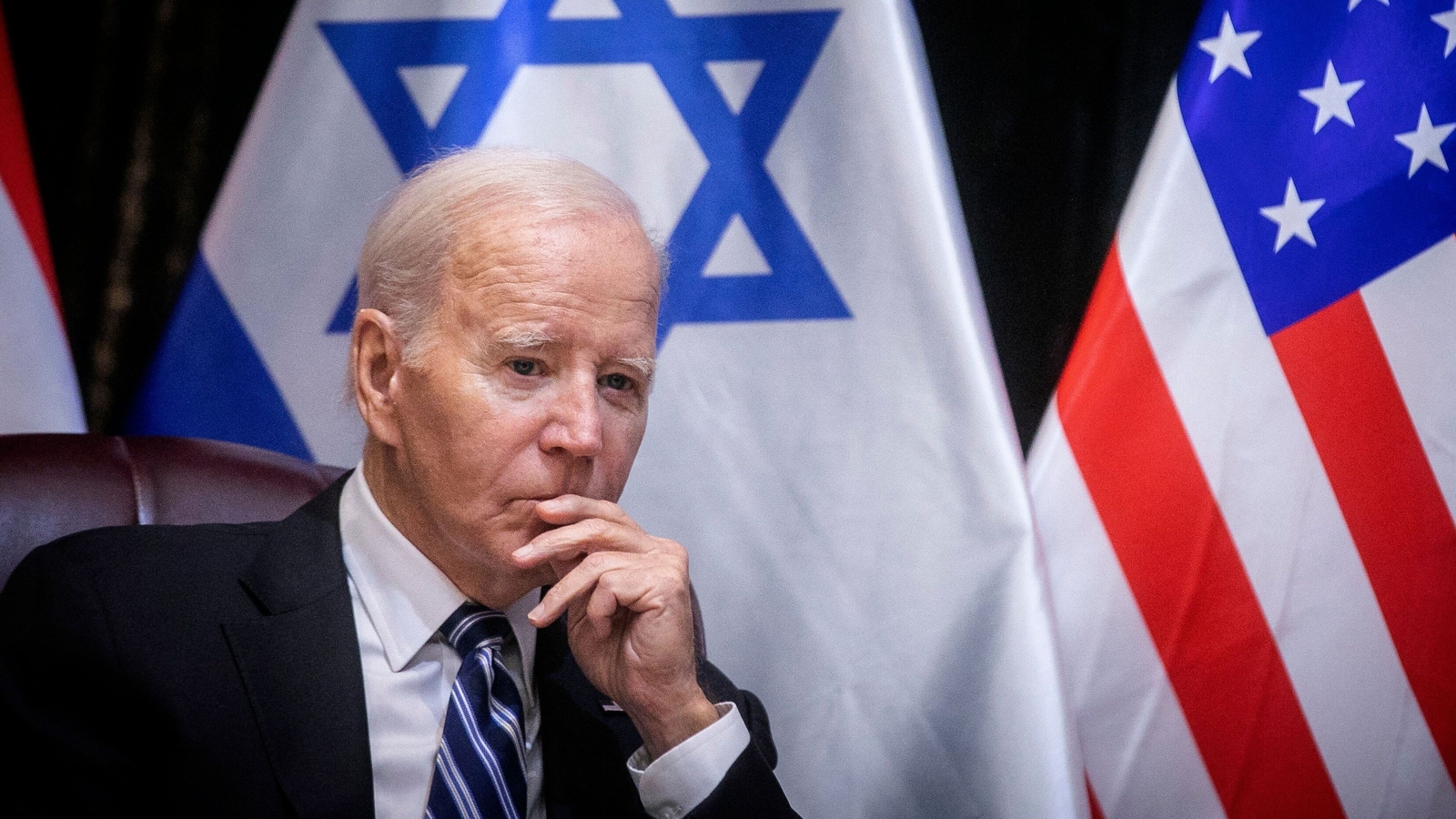Biden treading narrow path over his Gaza war stance

Last Tuesday, the voters in the Democratic primary in the city of Dearborn chose “uncommitted” over the current President of the United States Joe Biden.
By a margin of 56% to 40%, Mr Biden lost in this Arab majority city and home of the Ford Motor Company.
The reason is Gaza, and Mr Biden’s unwavering support for Israel.
Yes, it was just one city; yes, it was a primary election; and yes, Mr Biden easily won the whole state, scooping up 81.1% of the vote.
But “uncommitted” came second, with 13.2%, well ahead of the other two actual humans on the ballot, who mustered 6% between them.
In the super-tight arithmetic of this year’s presidential election, every vote counts especially in Michigan and Democrat strategists fear votes that have drifted away from the party and its candidate in February may not return in November.
As a result of a strong showing in two counties in the southeast of the state around Detroit, Dearborn and Ann Arbor which is a university town, “uncommitted” was awarded two delegates to the Democratic Party convention in Chicago in August.
They, whoever they are and they haven’t been chosen yet by the local Democratic Party, are free to vote for whoever they want but if the Gaza war is still raging in August, expect them to be loudly condemning Mr Biden and becoming a lightning rod for opposition to his Gaza/Israel policy.
Which means the protest movement could break out beyond the state lines of Michigan, potentially becoming a vulnerability in other battleground states where the margins were even finer in 2020.
The president’s advisors and campaign staff knew he would face opposition in Michigan, a state with a 300,000 Arab-American community, significant groups of students and black voters, all known to be angered by the White House’s apparently unswerving support for Israel despite the mounting death toll in Gaza.

But they were reportedly taken aback by the scale of the revolt at the ballot box pulled off by “Listen to Michigan”, a campaign group set up to garner a protest vote and take advantage of Michigan primary election rules, which include a checkbox for “uncommitted” on ballot forms.
The “uncommitted” option provides an alternative for those who like to vote, but don’t like the candidates they are presented with, a sort of official way to spoil a ballot paper.
The campaigners, who include Rashida Tlaib, a Democrat member of congress and the only Palestinian-American in the House, set a target of 10,000 votes.
This was roughly the number by which Donald Trump beat Hilary Clinton in the state in the 2016 presidential election.
In the end they got 106,000.
Mr Biden beat Mr Trump in 2020 by less than 155,000 votes, a margin of just over two percentage points.
The last time a Democrat incumbent contested a primary in Michigan was 2012, when Barack Obama was deep into the wars in Afghanistan and Iraq.
“Uncommitted” was on the ballot then, as well, but only mustered 21,000 votes.
Hardcore pollsters say the “uncommitted” vote would have to double in numbers to sink Mr Biden’s chances in this crucial battleground state, one of the half-dozen or so places where the next presidential election will be decided.
But Gaza and Israel are a growing problem for the president.
It has clearly been that way since the second month of the war, when opinion polls started to show significant disillusion with Mr Biden among not only Arab Americans, but also the more numerous black and youth voters.
They were a key part of the election winning coalition of voters that the Biden campaign was able to put together in 2020, bringing energy and volunteers to the campaign, and lots of first-time voters to the ballot boxes.
Keeping them on board will be vital if Mr Biden is to retain power in November.
Mr Biden’s “ice-cream moment” last Monday has to be seen in this context.
For many a deeply inappropriate photo-op to spring what appeared to be major diplomatic news: The president’s hope that a ceasefire, return of hostages seized by Hamas, and food and medicines shipments into Gaza could be achieved by this coming Monday.
We need your consent to load this comcast-player contentWe use comcast-player to manage extra content that can set cookies on your device and collect data about your activity. Please review their details and accept them to load the content.Manage Preferences
It was the kind of thing voters going to the polls in Michigan the following day wanted to hear.
It was done in a TikTok friendly way.
“Look, it’s the president holding an ice-cream, what’s he saying?”
However, who knows, it might have reached the younger voters.
While the statement may also have been a way of putting pressure on negotiators involved in ongoing talks for just such an outcome before Ramadan begins on 10 March, it always looked a bit ambitious.
So it proved, with the president walking back the remark on Thursday, saying he remained hopeful, but it would take more time.
Friday, the president announced the US would join a multinational effort to airdrop supplies into Gaza.
There have been a growing number of “anonymous” officials making clear the president’s displeasure, indeed anger, with Israeli Prime Minister Benjamin Netanyahu who has been frequently briefed against since January.
The rift between the two leaders became obvious when, after two months of calling each other every second day, Mr Biden suddenly stopped talking to Mr Netanyahu for almost a month.
There were no calls between the two leaders from 23 December 2023 to 19 January 2024.
Officials spoke of “immense frustration” with Mr Netanyahu for not actioning issues the US regarded as priorities, notably around humanitarian aid and releasing seized tax revenues due to the Palestinian Authority in the West Bank.
“At every juncture, Netanyahu has given Biden the finger,” Democrat Senator Chris Van Hollen told Axios.
Mr Van Hollen said the administration “are pleading with the Netanyahu coalition, but getting slapped in the face over and over again”.
Secretary of State Anthony Blinken has made a point of meeting Mr Netanyahu’s political rivals in the cabinet like Benny Gantz, who Israeli polls say would easily defeat Mr Netanyahu if an election were held now, and Yoav Gallant who is the Defence minister and chief rival inside the Likud Party.
Much of the US diplomacy lays emphasis on what needs to be in place for the day after the war ends and a path for Palestinian progress.
But the diplomatic subtleties are no match for the din of the fighting when it comes to connecting with the global public.
For now, Mr Biden will settle for connecting with the American public, particularly the Democratic and Independent voting parts of it.
The latest polls on the matter aren’t great for the president.

A Reuters/Ipsos poll published on Thursday showed 56% of respondents who identified themselves as Democrats said they were less likely to support a candidate who backs military assistance for Israel, compared to 40% who said they would be more likely to support such a candidate.
Mr Biden and his likely Republican opponent, former President Mr Trump, were tied with 36% support each in a hypothetical matchup, with the rest of poll respondents saying they were not sure or would vote for someone else or no one at all.
“Uncommitted” strikes again!.
In such a tight race, the Biden campaign’s outreach staff are going to places like Dearborn and asking Arab American voters if they think they will be better off under a Trump Presidency, reminding them that one of Mr Trump’s very first actions on coming into office in 2017 was signing executive orders that first stopped, then restricted, travelers and asylum seekers from a number of Muslim-majority countries entering the US.
A growing minority of Democrats pin the blame for the conflict on Israel’s government: 22% of Democrats in the poll blamed the Israeli government for the conflict, compared to 13% in the November poll.
Some 46% of Democrats said they blamed Hamas, down from 54% in a November poll.
Democrats also overwhelmingly said they wanted a presidential candidate who would call for a ceasefire in the conflict.
While Mr Biden has tried to balance his support for Israel with calls for its military to do more to avoid civilian casualties, Mr Trump has voiced full-throated support for the US ally, a position that appeared in line with the views of many Republicans.
Some 62% of Republicans in the poll said they preferred a presidential candidate that favors supplying Israel with military aid, while 34% said that stance was a turnoff.
Another poll, published on Tuesday by Data for Progress, reported voters disapproved of the way Mr Biden is handling the conflict by a 21-point margin, with 57% disapproving and 36% approving.
In this poll, disapproval is mainly driven by Republican voters, amongst whom 79% expressed disapproval, but that is to be expected in the almost tribal world of US politics these days.
Among Democrat voters there is still support for the Mr Biden way, but the approval rating stands at plus 31 points and is only half that of the overall job performance measure which is plus 60 points.
So, there is clearly a problem.
Of all voters, 67% – including majorities from both parties and independents – support the US calling for a permanent ceasefire and de-escalation of violence in Gaza.
The current talks are around a six week-minimum ceasefire, not a permanent one.
This was a six-point increase in support for a permanent ceasefire since the poll last asked this question in November.
The pollsters also say there is broad support among US voters for attaching conditions to US military aid to Israel, notably around guaranteeing a right of return to Palestinians displaced in Gaza (+59 points), committing to talks on a two-state solution (+52 points), stopping indiscriminate bombing (+46 points) and stopping settlement building in Palestinian territories (+47 points).
Of all voters, 61% approved the president’s recent executive order that will impose financial sanctions and visa bans on Israeli settlers who engage in violence against Palestinians in the West Bank.
Thus, Mr Biden finds himself treading a very narrow path between the views of the electorate on one hand and his own convictions on what is the right thing to do for Israel, which he has long supported.
However, not necessarily the current government and the trauma it suffered from the 7 October attack by Hamas and for the Palestinians and their tens of thousands of dead.





